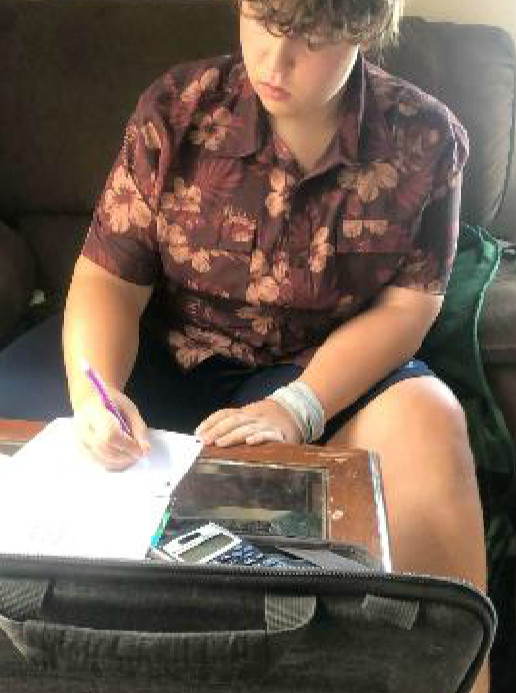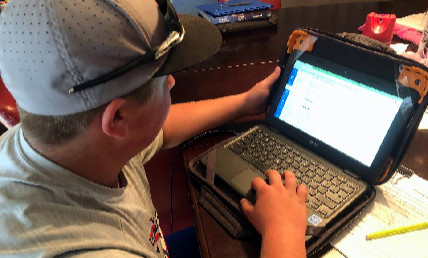By Zach Gullion
The Internet has become a staple in the households of the middle class and beyond as more and more residents work from home. With the current pandemic, eLearning has become a common way to continue education with students who are quarantined.
However, many students are disadvantaged due to the very thing meant to help them: their internet connection.
The Delaware Community Schools’ district is riddled with areas that lack coverage from internet providers. Major companies like Comcast and AT&T can’t reach some places throughout the community, leaving satellite and cellular providers to do the job. However, these options tend to be expensive.
Many students and some teachers currently find themselves having great difficulty doing work from home. Mr. Greg Kile, Director of Curriculum Assessment and Student Services, is working with others toward a solution to get students the access they need.

While coverage isn’t the best throughout the district, “We were looking at 2 to 3 percent of our students who were indicating they had no form of internet access at all,” Kile says.
Even though students without any form of internet access are rare, they still exist. For all students to be able to complete eLearning assignments when away from school, families have come up with creative solutions.
“We’ve watched families do things ranging from purchasing hotspots of their own … and be successful with those hotspots. We’ve watched families partner with friends and families around them who do have access,” Kile says. “We’ve seen families who drive to locations like a parking lot where they can get access in a parking lot some way. We’ve gone as far to make sure it’s available in our school parking lots.”
Kile says that the key problem isn’t necessarily about students’ access to the internet, it’s about their access to “quality, high-speed internet.”
Sophomore Lauren Buckley has been without wifi at her home for the past six weeks. She has been able to do assignments from home via her AT&T cellular connection, but says that it’s not always the most reliable.
“It depended on how many devices were connected to it at one time,” she said. “I’d have to shut the wifi off on my phone in order to make it stable on my chromebook.”
When worse comes to worst Buckley says she’ll “mooch off my grandma’s wifi.”
Similarly, sophomore Gaige Winchester has had occasional internet issues. He says he had to email all of his teachers using his cellular connection during our first week of school-wide quarantine in August telling them that his internet was out.
Buckley believes that having internet access isn’t much of a learning advantage over those who don’t because “there’s lots of multiple ways you can have internet access. I know the library up in Albany, when it’s open, has wifi.”
However, sophomore Hunter Linn believes that those with better access have “somewhat” of an advantage because they don’t have to worry about their cellular data usage running low and can have “free reign” on what they search.
Art teacher Ms. Alicia Fuller, who doesn’t have wifi at her home, says she and her son aren’t at much of a disadvantage because they are able to go to her parents’ home where there is a good internet connection. She says that students who don’t have that kind of support system may have a disadvantage, especially because teachers are discouraged from sending home paper packets.
To combat the issue of slow and problematic internet service and to help students achieve academically, Kile says Delcom was awarded a grant to begin distributing cellular data hotspots to those most in need, starting the week of Nov. 9.
Deciding who gets the hotspot is no simple task. Kile describes it as an “equity issue.” He believes that the longer the current pandemic rages on, the more the equity issue grows.
“As educators, I would argue, historically, one of our roles has been to address those when we see them and close those gaps,” Kile says.
He says that the challenge for hotspots has been “how do we do that in a way that’s sustainable, reasonable, economical, and fair?”
Delcom worked to develop criteria of who should receive the hotspots, Kile says. This included families who didn’t live in a geographical area capable of receiving a $10 internet option from Comcast or AT&T. He also says that they looked at socioeconomic status to see who was most in need.
Kile says that through relationships formed between families and teachers and principals, he was able to tell who was having a problem with internet access at home. “Through interacting with students, monitoring who’s completing work on a regular basis and who’s not, and following up if we see that work’s not getting done,” he says. “They’ve been able to really move mountains in terms of identifying who may be having difficulty for one reason or another.”
Kile adds: “It’s great to know what the data is, but let the relationship reign supreme at the end.”
He says that in the past they may have been able to take their time with finding viable internet solutions that may be cheaper, but with our current situation, the necessity of good access is just too urgent. He says that there is “no expense too high within reason.”
Students aren’t alone in their journey with the difficulties the internet poses as teachers also face the challenges of lackluster internet access.
English teacher Mr. James Lodl used to face many difficulties with his home internet. Lodl says he and his wife, agriculture teacher Mrs. Nicole Lodl, used to use a Verizon hotspot, but they would be charged by the gigabyte after a certain amount. He says, “We had to go in with a plan about how much we were going to download, what we were going to watch, what we were going to stream.”
After deciding to switch to AT&T, Lodl says they were provided better coverage at a lower price.
With Delcom rolling out hotspots to many families in need throughout the district during this time of continuous uncertainty, the goal for students with poorer internet access is to continue learning daily, virtually and safely.






